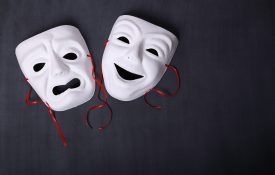-
Negative Emotions are Key to Well-Being
Scientific American Mind: A client sits before me, seeking help untangling his relationship problems. As a psychotherapist, I strive to be warm, nonjudgmental and encouraging. I am a bit unsettled, then, when in the midst Visit Page
-
Wide-Eyed Fear Expressions May Help Us – and Others – to Locate Threats
Wide-eyed expressions that typically signal fear may enlarge our visual field and mutually enhance others’ ability to locate threats, according to new research published in Psychological Science, a journal of the Association for Psychological Science. Visit Page
-
Four APS Fellows Elected to NAS
Five psychological scientists, including four APS Fellows, are among the 84 new members and 21 foreign associates elected to the National Academy of Sciences, in recognition of their contributions and achievements in original research. Among Visit Page
-

Awfully Funny
Mankind has endured no greater tragedy than the Holocaust, but that hasn’t stopped comedians from joking about it over the years, nor audiences from laughing. Take a classic 2004 episode of Curb Your Enthusiasm, the Visit Page
-
May/June 2013 Rising Stars
This month, we conclude a multi-part APS series profiling Rising Stars in psychological science. The series, which began in the March issue of the Observer, highlights young luminaries in the field of psychological science. Eliza Visit Page
-

The Compassionate Mind
A growing body of evidence suggests compassion is a natural and automatic response that has ensured human survival. Visit Page

